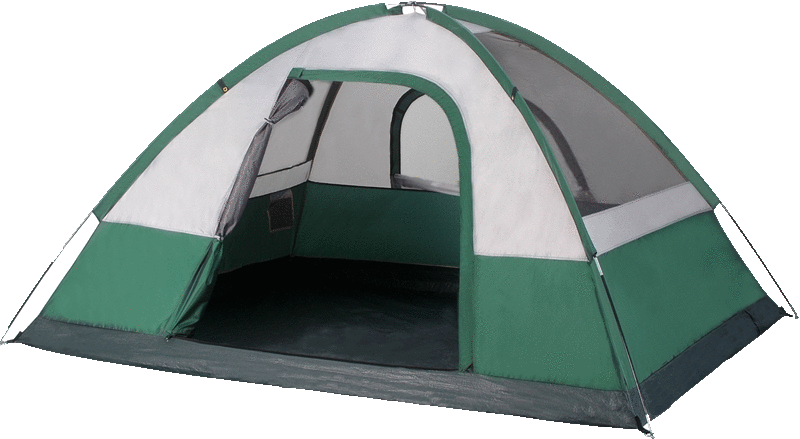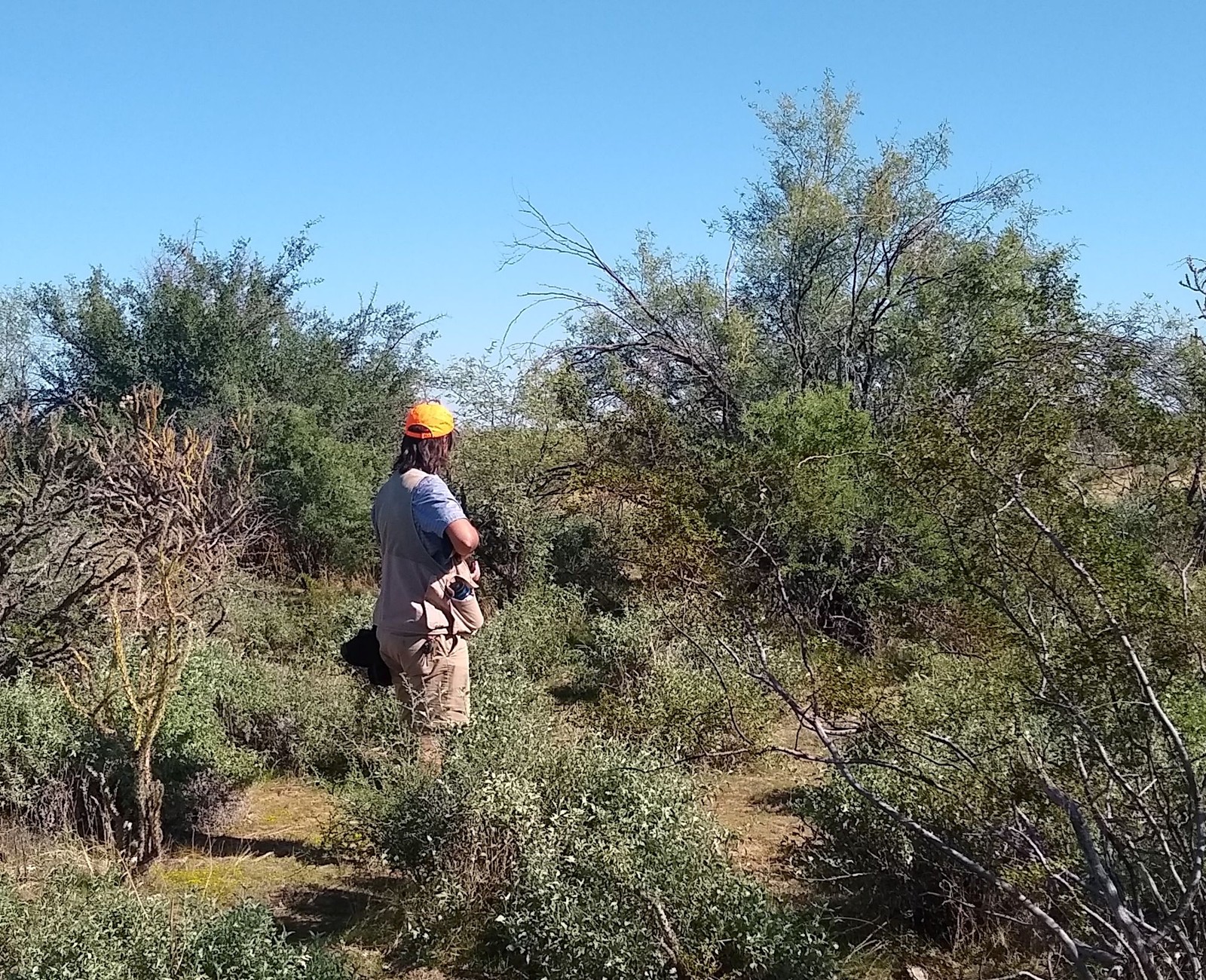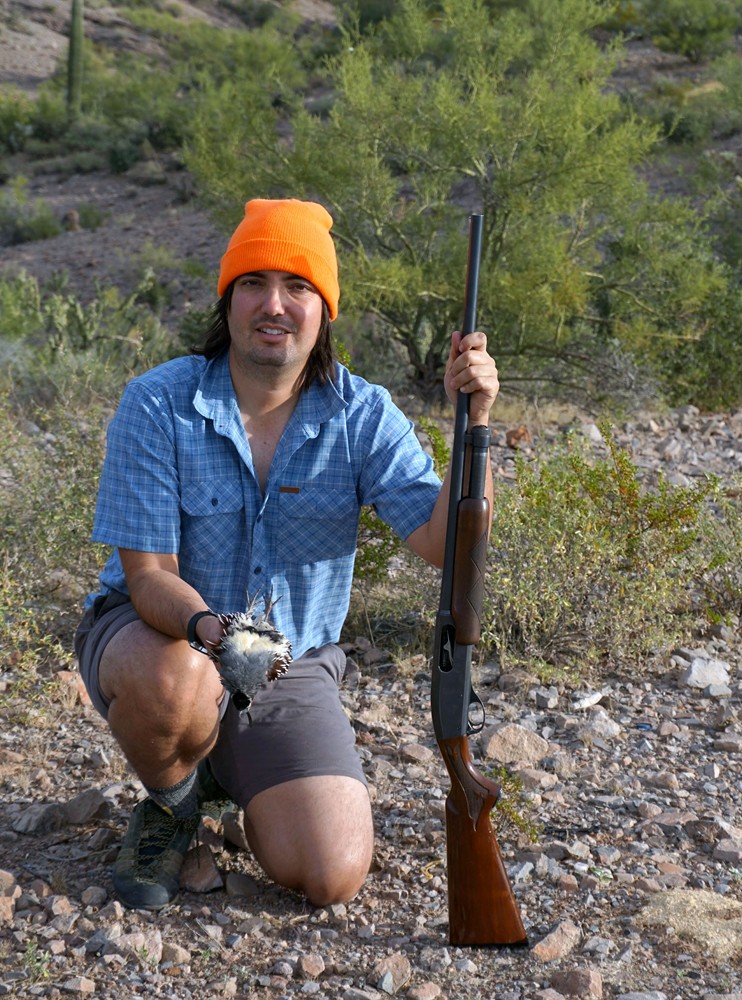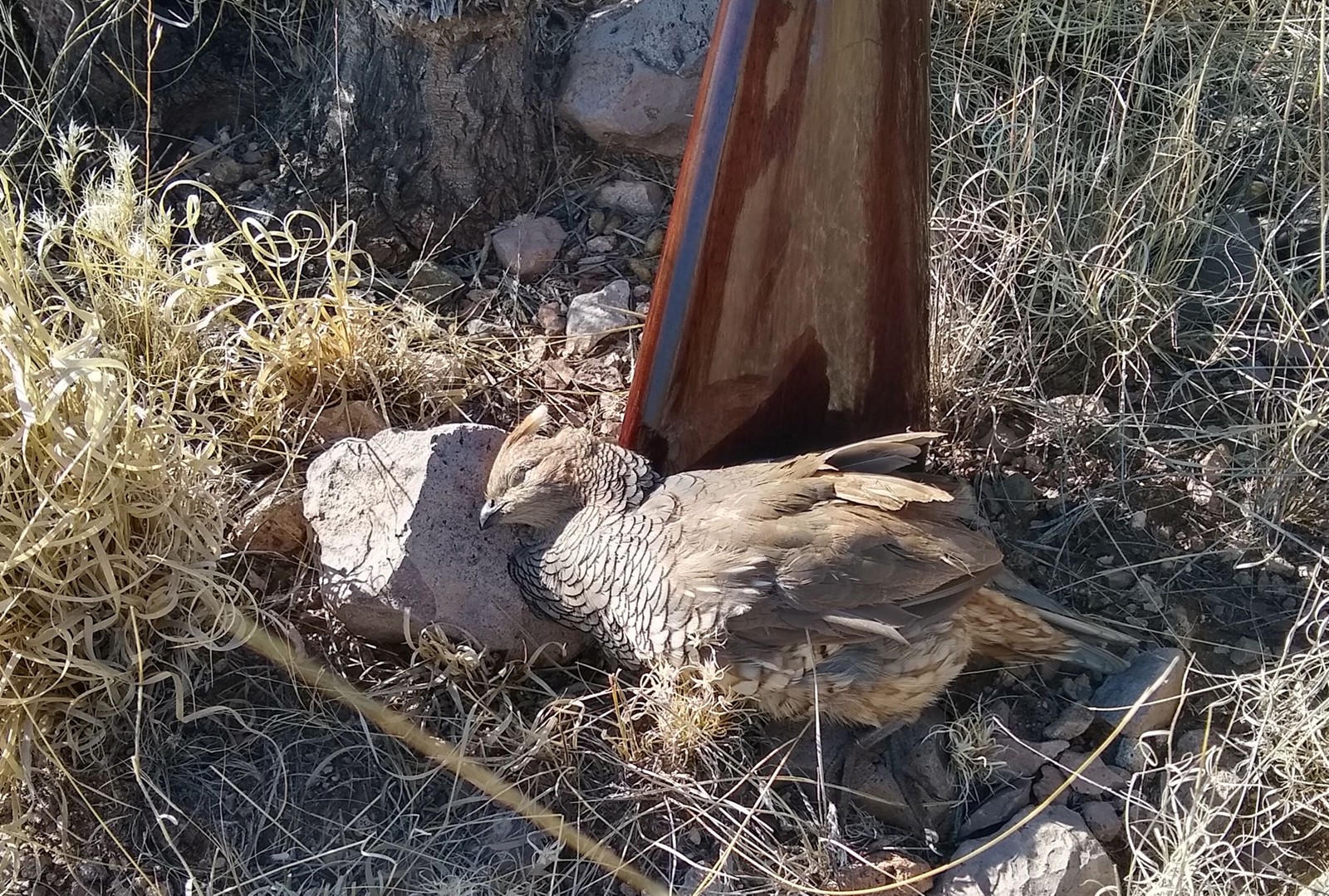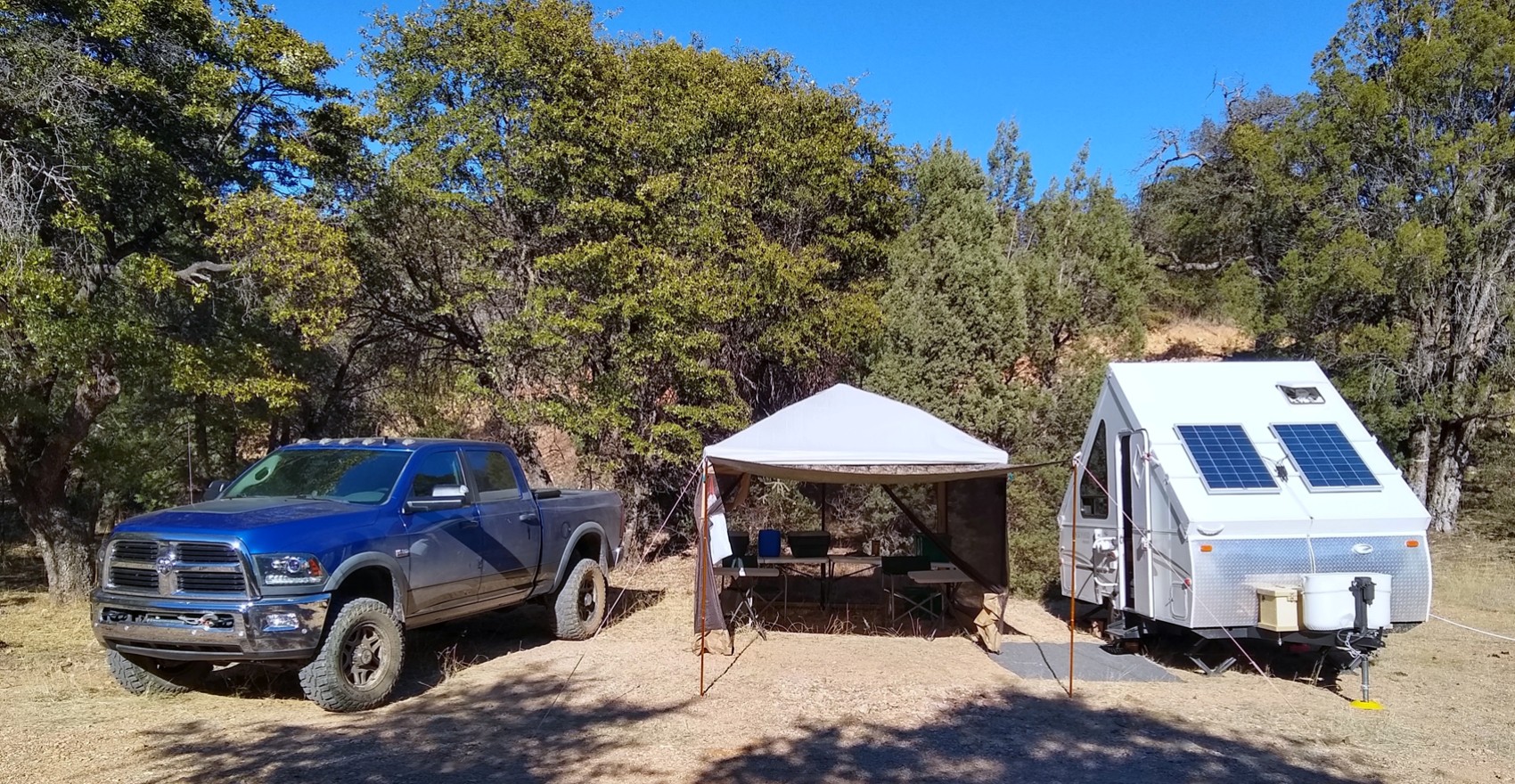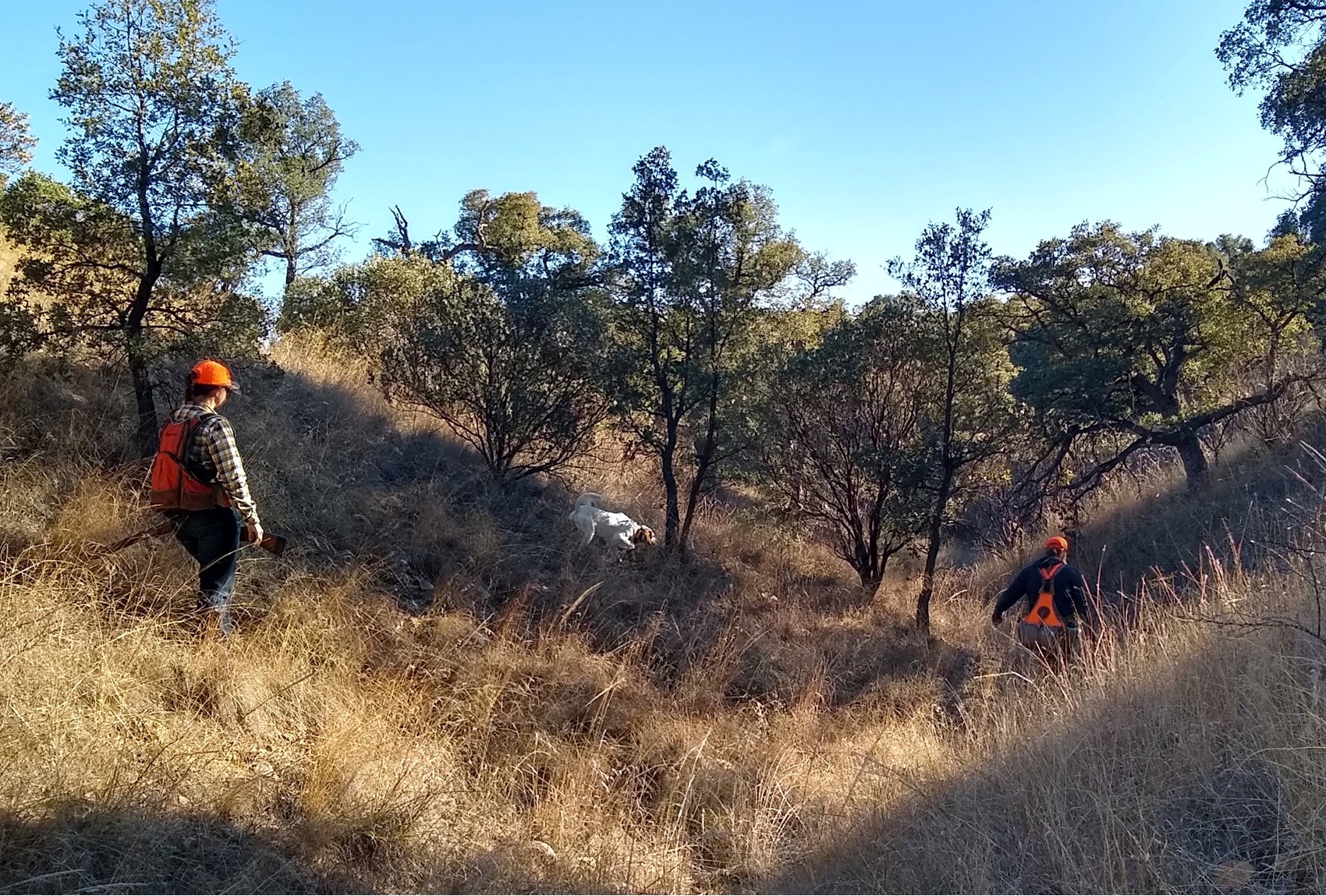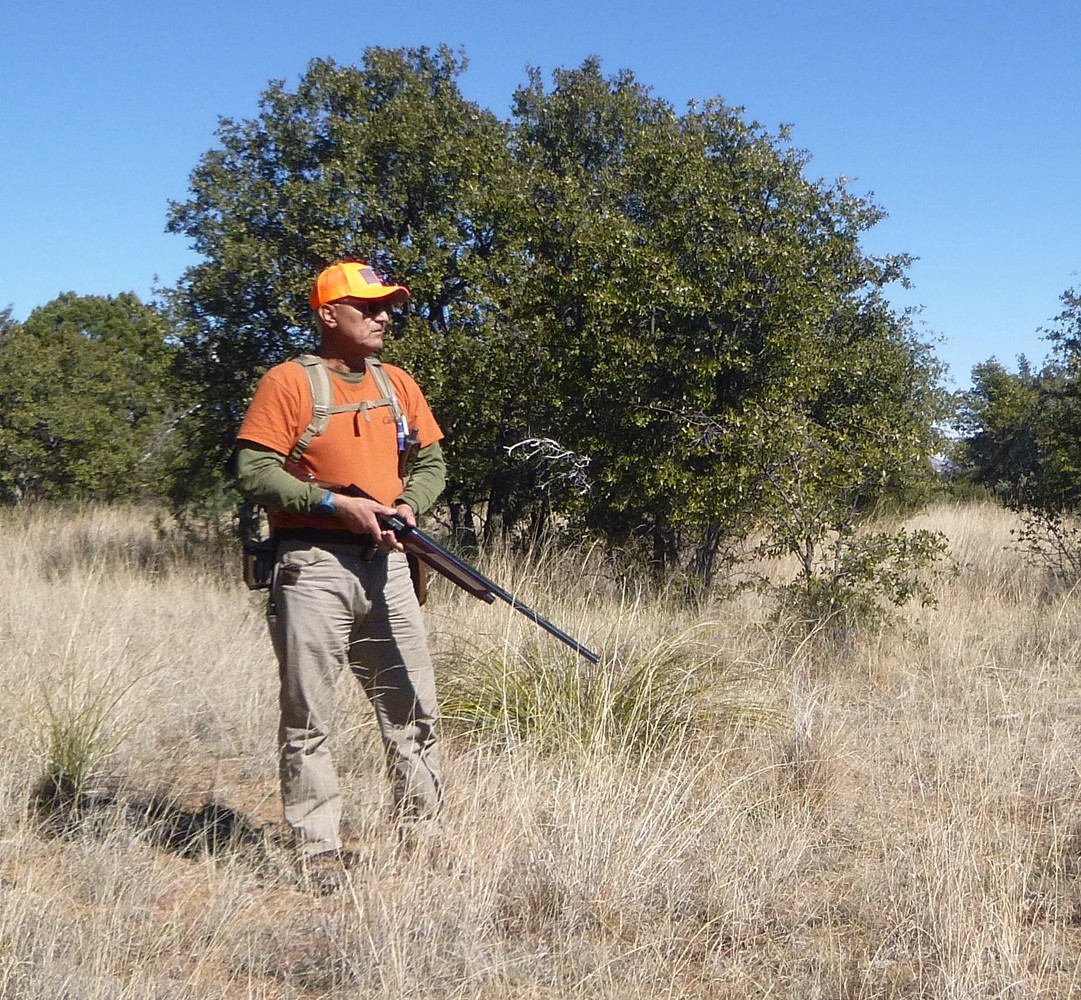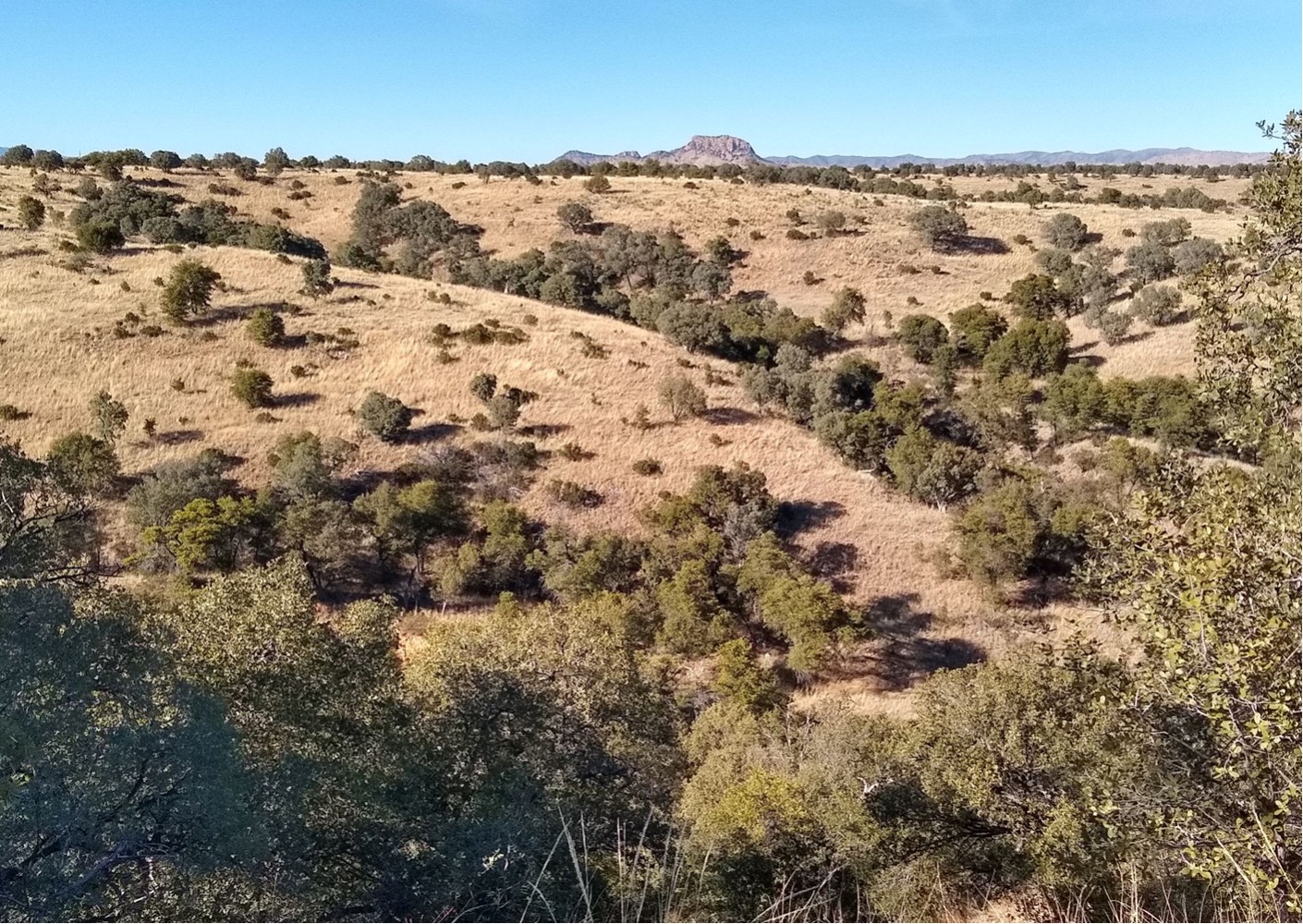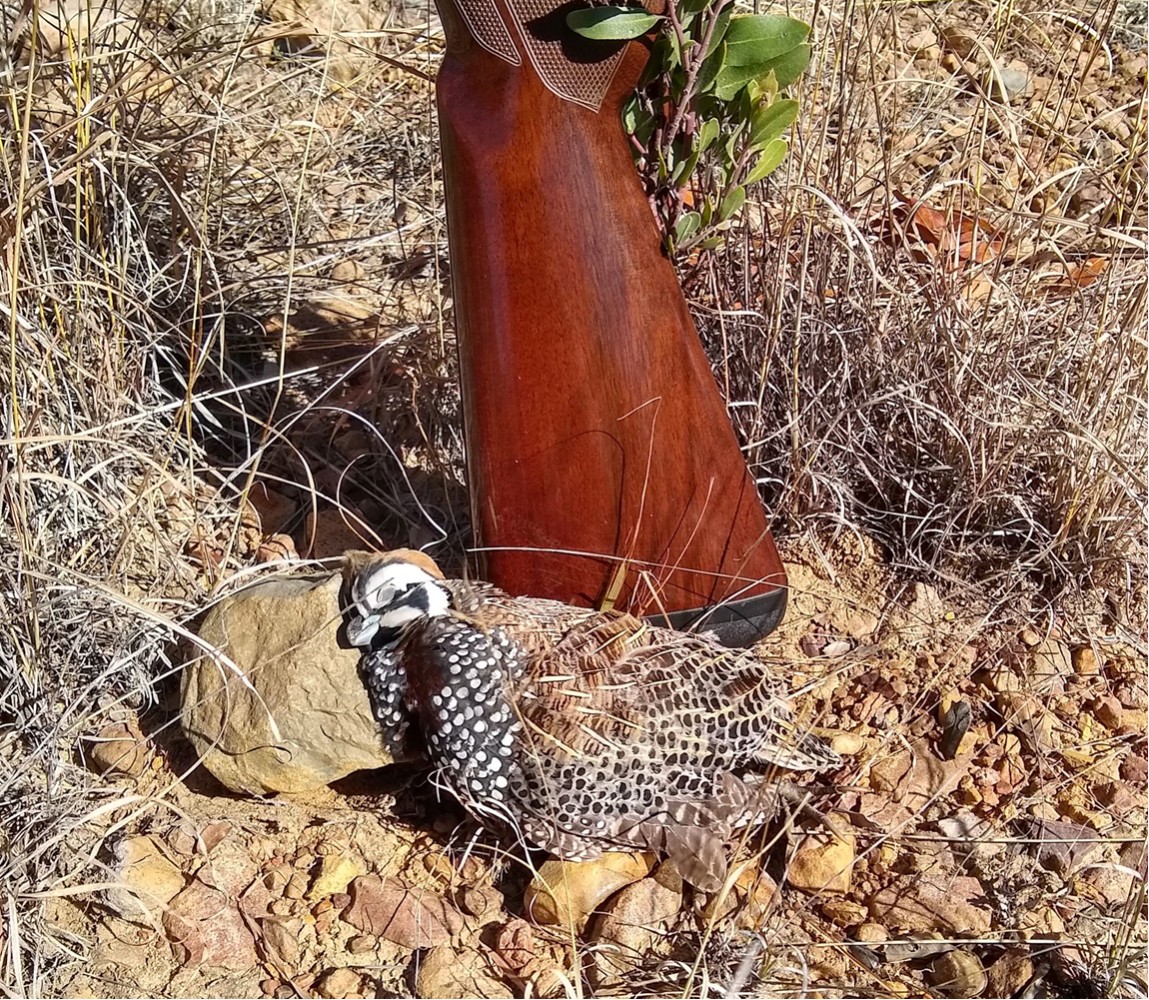“It’s only three little birds. How hard can that be?”
When my son Ben and I failed to get drawn for any 2019 big game tags, I was
in a deep funk. Every year I look forward with great anticipation to a
fall deer or elk hunt, or both! With no big game hunt on the calendar this
year, I was lost, dazed, and confused.
Right after learning our fall fate, Arizona Game and Fish put out a Wildlife
News story about the
Small Game Challenge. There are actually four sub-challenges within the
Small Game Challenge:
- Native Quail Challenge – One of each of Gambel’s, Scaled, and Mearns’ quails.
- Desert Small Game Challenge – Five of seven of the three quail species plus Mourning, White-Wing, and Eurasian Collared Doves, plus Cottontail Rabbit.
- Mountain Small Game Challenge – Five of seven of Blue Grouse, Chukar, Band-Tailed Pigeon, Cottontail Rabbit, Abert’s, Kaibab, and Red Squirrels.
- Ultimate Upland Bird Challenge – All of the three quail species, plus Blue Grouse, and Chukar.
You are allowed to sign up for one of the four challenges in any given year,
making this a potentially multi-year quest. For our first go, I was able to talk
Ben into signing up with me for the Native Quail Challenge. Like I said, it’s
only three little birds. Should be easy, right? Well, no. I was to find out
that each bird would take me multiple trips to check off.
Gambel's Quail
This species was maybe the most frustrating for me. I see them all the time in
my neighborhood and in my backyard, but I can’t shoot them there, now can I?
My quest for Gambel’s started back during Dove season. Ben and I went out west to
a cow pond where I had taken a few dove last year, and while we waited for the
doves to fly by, we had a nice covey of Gambel’s quail walk right between where
Ben and I were sitting. That was the moment when I started thinking about buying
a Browning Sweet 16 (see follow-on story).
Later during dove season, but still before quail season had opened, I drove out to
another cattle tank that I had discovered near Morristown. The tank was totally
dry, but there was a huge covey of Gambel’s quail inhabiting the thick mesquite
that grew on the high berm of the cattle tank. I could have taken bird after bird
after bird as they exited the tangled cover after I had disturbed them.
I explored the desert around the tank and found quail there as well. I made a
mental note that I had to come back here after quail season opened.
And I did, I think four times, and I could not bag a quail here. It seemed so
promising! Oh, we found them. The desert here is pretty flat, but with good thick
cover. The photo above is of Ben on one of our trips to this area. Sam went with
us on one of our trips, and he was able to take a couple of Gambel’s here.
Ben did knock one down once, but it wasn’t a fatal hit. We marked where it went
down and gave a good search. Eventually, I found it peeking out from within a
large packrat’s nest. We even spooked the packrat out! We started dismantling
the nest to retrieve the bird, but then it occurred to me that even if we did
retrieve it, the bird may be covered in hantavirus now. We abandoned the recovery
effort.
Ben finally managed to check the Gambel’s quail off his list on an overnight camping
trip near Lake Pleasant with some buddies of his.
It was now December and I still did not have quail-one to my credit. I decided to
put the Quail Quest on the back-burner and concentrate for a while on my other hobby
of geocaching.
It was on a geocaching trip to Wickenburg that I finally got my first Gambel’s of
the season. The geocache was on about a mile-long hike along a backcountry trail.
I took my shotgun on the hike with me, just in case.
After finding the geocache, almost back to the truck, I heard the alarm chuckles of
Gambel’s quail. There was a good-sized covey here, judging by the quantity of
vocalizations I was hearing. Soon enough, I spotted one in the clear about 30 yards
away. I carefully pointed and sniped him on the ground.
If you’ve ever hunted Gambel’s quail, you know how hard it is to hit one on the wing.
They usually get up and fly off when you are still 70 or more yards away. Then when
they land, they just keep running!
That’s what was happening to me in Morristown. The thick patches of cover are
interspersed with open patches, and they had me running all over hell and back
trying to keep up with them. Frequently, the best way to get one is to take a
shotgun sniper shot when they are still on the ground.
I only took the one out of the covey. That’s all that I needed for the Challenge,
so I did not feel compelled to try to take any more.
Scaled Quail
The next two species I needed to get would take some travel. I could seek Gambel’s
on an easy day trip from home, but Scaled quail inhabit the southeastern corner of
the state, a trip of several hours duration for me. It turned out to be a good
thing that I was recently separated from Honeywell, as now I could hitch up my
little pop-up A-Frame camping trailer for mid-week quail safaris and still not
miss any club shoots on Saturdays!
I had never hunted Scalies before. I had seen them in the wild only once, gee,
at least 20 years ago on a deer hunt in the Peloncillo Mountains on the New Mexico
border. I at least had an idea of where I could go.
But for my first try for Scaled quail, I picked the foothills at the north end of
the Chiricahua Mountains. I would camp out for two nights, which would give me
one solid day, plus some time that I could squeeze in on drive days.
I was able to get out and hunt the afternoon after arrival and camp setup. I saw
some jackrabbits but no quail. In the morning, I drove to a different area. The
morning hunt was highlighted by the sighting of an OK shooter mule deer. Not a
big one, but enough horn that I would have pulled the trigger on him during deer
season. I was only around 100 yards from him. It would have been a chip shot.
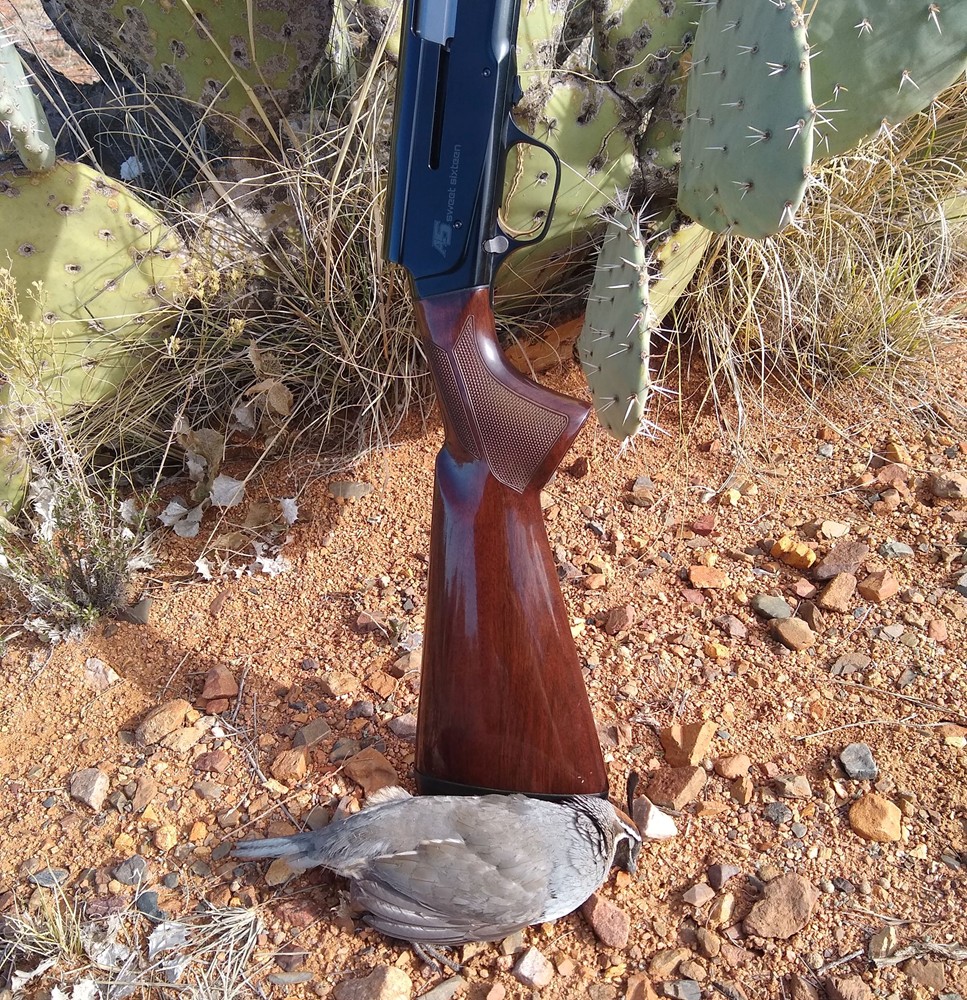
Gambel’s quail taken while seeking Scaled quail at
the north end of the Chiricahua Mountains
|
I headed back to the trailer for lunch and a little loafing around. After lunch,
I headed back to the area of the deer, but a little further down the rough dirt
track. I parked at the wide entrance to a canyon. This looked promising. And
indeed, I did find a large covey … of Gambel’s quail. I took one of them, then
headed higher up the canyon to see if I could find any Scalies. After all, I
didn’t drive 200 miles just to hunt Gambel’s! But by the end of the trip, no
Scalies were seen, no Scalies were taken.
After getting home, at one of the club shoots, I asked Gerhard where he had taken
Scalies before. He mentioned a couple of places both south and north of Willcox.
I checked the areas that he mentioned on the sat maps, and also consulted the Game
& Fish “Where to Hunt” pages on the website. This research led me to pick an area
about 10 miles west of Willcox.
Once again I headed out for a two-night, three day hunt with my pop-up trailer. I
asked both Steve and Gerhard whether they would be interested in coming along, but
both were busy. Ben couldn’t go in the middle of the week.
It was getting late in the season. If I could not get a Scalie on this trip, there
probably would not be enough time left to still get two more quail species. I had
to get my Scalie on this trip, or I would have to give up on the challenge.
On the afternoon of my arrival, there was a heavy cold wind blowing. Nevertheless,
I got out for a little walkabout but had no luck. In the morning, temps were still
on the cool side, but thankfully, no wind. This was cow country. There were a
number of decent dirt roads that went from cow pond to cow pond, that I was able
to use to go deeper into the country. I stopped at one place for a walkabout, but
still no luck.
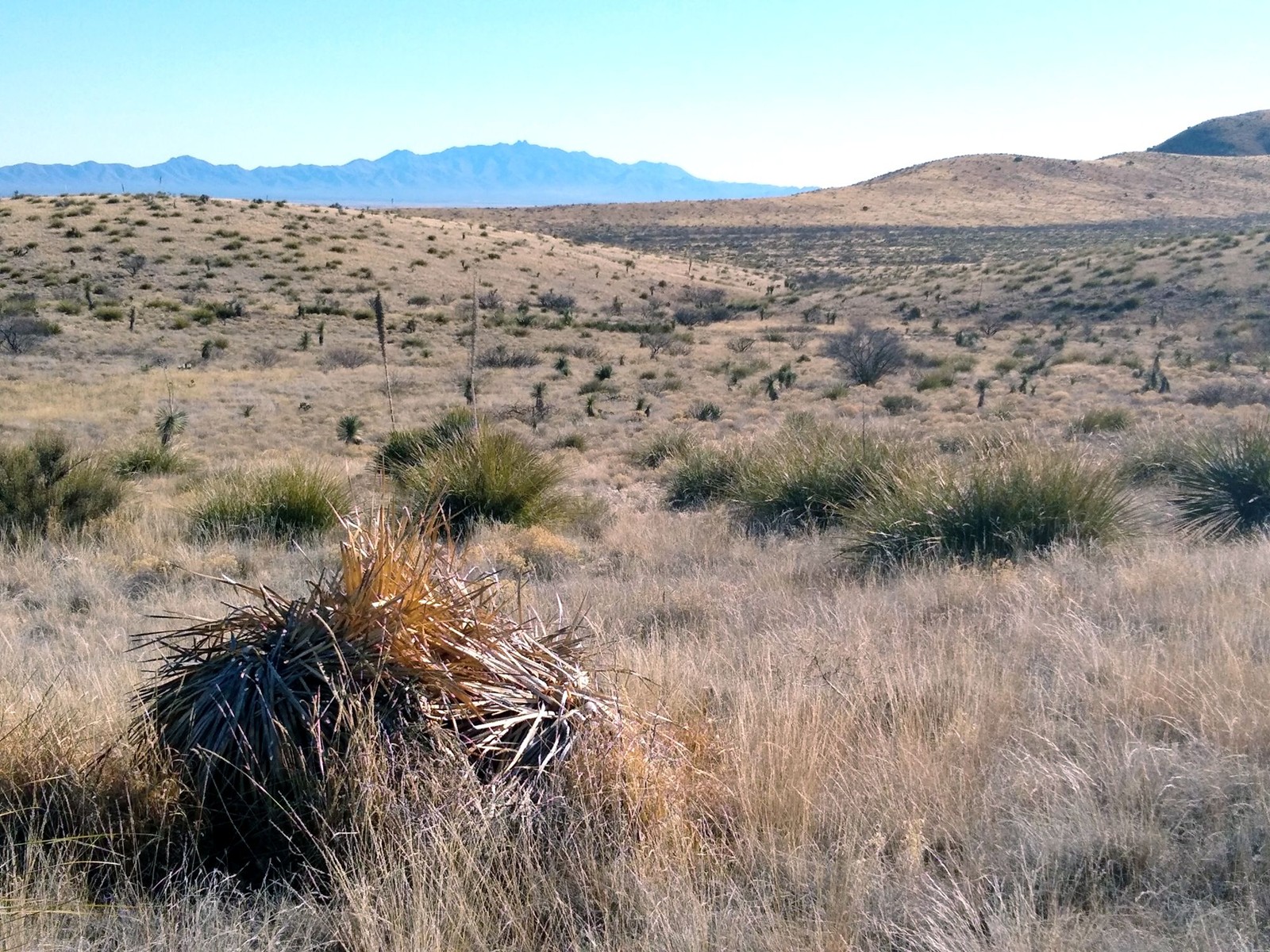
Good grass, man – Scalie country near Willcox
|
I got back into the truck and headed on to my next stop. This next stop was at the
head of a shallow valley. The grass looked good here, like the cattle had not
overused this section of land.
Gambel’s quail can frequently be found when you hear them before you see them.
They can be quite vocal. I had no idea what Scaled quail sounded like. Would I be
able to find them by ear, as with Gambel’s? Would they start making alarm sounds as
I approached to let me know they were around?
The Game and Fish website says that Scalies are runners, just like Gambel’s. I had
installed a modified choke in my shotgun anticipating a somewhat longer shot. Would
I have to ground snipe these quail too?
From the truck, I ended up walking across the valley about a quarter mile to the top
of a low ridge. No sign of anything so far. But as I walked along the top of the
ridge, the whirring of a quail’s wings told me that I was on to them! It busted from
cover pretty close, with no prior warning. A swing and a miss!
But this greatly lifted my spirits. I had a chance! I started making a tight zig-zag
across the top of the ridge. I figured that the more thoroughly I covered the area,
the more likely I was to kick up more birds.
It worked! A second bird lifted off from his hiding spot in the grass. He was flying
away, but at a crossing angle. I consciously swung the barrel to him, then just a
little past before activating the trigger. Perfect hit! He went down in a heap. I
marked the spot and walked up to it. It still took me about two minutes of looking
before I spotted him. His camo is very good. First Scalie, right on!
I continued hunting until lunch time approached. I had one more jump up, but I missed.
This one jumped up a little behind me. As I swung on him, I ended up with my feet all
crossed up and I started to lose my balance as I tried to swing behind me.
But all was good. I only needed one, so after lunch I just did some pistol target
practice at camp and didn’t bother trying to find any more quail.
I still don’t know what Scaled quail sound like. None of the three that I flushed made
any vocalizations. And in this limited experience, I didn’t see any running. Plus they
jumped up reasonably close for sporting shots on the wing.
At least now the quest was still on. I still had a chance to meet my goal. One more
quail species to go, but time was quickly running out.
Mearns' Quail
I have seen and even shot some Mearns’ quail down in the Mexican border country while
hunting or scouting for Coues Whitetail. So naturally, my old deer hunting haunts was
where I decided to go. I haven’t been down there in a number of years. I kind of gave
up on hunting down there due to all the border troubles. I’ve never had a serious
confrontation while in the backcountry, but that real trouble could occur is always in
the back of my mind. Yes, the boys and I have seen drug smugglers while deep in the
border outback.
Recently, the wife and I got a second travel trailer. It’s a 24-footer with a bathroom.
That’s the problem with my little trailer – the girl needs her bathroom. Being a bigger
trailer, I can’t pull it into small back country hunting camp spots, but it works great
in RV parks. While re-familiarizing myself with the lay of the land in my old hunting
zone, I discovered a dusty little RV park in the town of Arivaca that I didn’t know about.
Arivaca is one of my jumping off spots to my deer hunting area.
As it turned out, the week that I planned to go, Jodi was off for a Girls Gone Wild trip
with some of her geocaching girlfriends to Hawaii. That left me and the dog behind. I
called up my buddy Brad, who got laid off at the same time that I did, to see if he wanted
to head down to Arivaca with me and the dog. He said sure!
Again, it was to be a two night, three day trip, this time in the big trailer. We got to
the RV park in time to set up, then go for about a 30 minute backroad trip into the quail
country. I was heading for the area of a large cattle tank where Mark Snyder, Ben, and I
had taken some Mearns’ quail about 20 years ago.
We got to a good looking spot with a small trickling creek surrounded by grassy hills.
This was not exactly the same spot where Mark and I scored so long ago, but it was very
close. I started wandering the grass along the creek bottom while Brad headed for a ridge
top.
I brought my pup along with high hopes. Mearns’ quail rely on their camouflage to escape
predators. They sit extremely tight. You practically have to step on one before they
will jump into the air. A dog is a great help in finding these guys. My dog has no
training as a bird dog at all, but I have seen him point before. I was curious to see
whether he would be a help in finding these crafty birds.
The answer was no. I wanted him running around in front of me sniffing for the birds.
Instead, he sullenly followed behind me. Then when he got sick of wading through all the
tall grass, he just sat down. When I noticed that he was no longer with me, I had to
backtrack to find him. His coat is almost the same color as the grass. I thought that
I lost him for a few minutes, but then to my relief, I spotted him. Maybe now I’ll try
to give him some basic bird training, even though I know nothing about the subject right
now.

Brad with a Mearns’ hen out of Arivaca
|
In the meantime, I heard three shots come from Brad’s gun. I was able to coax Henry (my
pup) to follow me up the hill to where Brad was. Brad said that he thought that he had
knocked one down. I tried to help Brad search for a few minutes, but I really had no
idea where to look. Brad said that the rest of the covey had flown into the head of a
draw behind him. I left Henry with Brad in case he would be of some help in sniffing out
the bird (he wasn’t) and headed to the draw.
I traipsed through the tall grass at the head of the draw for a while but was not able to
force another flush. Finally I heard Brad yell something to me. He had found the bird.
It only took him about 20 minutes of criss-crossing the same ground over and over. He
said that it was just laying there out in the open. The bird’s camouflage was that good.
It turned out to be a Mearns’ hen.
We went out the next morning with no luck. Then in the afternoon, a good rainstorm came
in, so we had to hole up in the trailer. While stuck in the trailer, I pulled up a
YouTube video about Mearns’ quail hunting. One thing that rang a bell for us was a
statement that the best Mearns’ habitat is oak-grassland with between 25% to 40% coverage
by the oak trees. That did not exactly describe the country we were in. There were more
mesquites and ocotillos than oaks in our area. Though Brad got one, I left that trip still
needing to get a Mearns’.
While planning my next Mearns’ trip, I learned that the state’s hotspot for Mearns’ was
between Sonoita and Patagonia. I took a look at the satellite maps again to see where the
kind of country described in the video was located in that area. I saw a series of rolling
ridges to the west of Highway 82 with elevations in the 5000’s which had that supposedly
magical oak coverage ratio.
But I didn’t want to go to the popular area on the closing week of quail season. For one,
would the area by now be picked clean? Secondly, I didn’t want to be bumping against every
Arizona pro quail hunter and his dogs. So I looked for similar topography and habitat away
from the state hotspot. I did find such an area. I also found a nearby camp spot to which
I could get my little trailer.
During the last week of the season, a cold front came through the state. My chosen camp
spot would have overnight temperatures in the 20s. That’s not good for my trailer’s water
pipes. I had to wait until Thursday to head down. That would give me Thursday afternoon,
through Sunday, the last day of the season. Cutting it kinda close, huh?
I told Ben my plans, gave him directions and coordinates, and asked if he was going to meet
me. He said that he would come down on Saturday. Ben still needed Mearns’ AND Scaled quails.
It was not looking good for Ben to be able to meet the challenge before the season closed.
On arriving to my chosen camp spot, I found a vehicle already parked there. Oh no! I didn’t
have a backup spot picked out. No one was there. I checked out the vehicle and I made a
guess that they were not planning to camp. I thought that they were just there to hike.
I started setting up my normal A-Frame boondock trailer camp – the front of the trailer with
solar panels pointing south, accordion frame canopy off the trailer door, truck parked on the
other side of the canopy. About half-way through setup, a man, woman, and a dog came back to
the vehicle and I got confirmation that they were just hiking. Whew! The camp spot was mine.
After setup, I had time to go out on an afternoon quail foray. The area where I camped
actually had almost total tree coverage. But the main road that I was on ran past the top of
a series of ridges that each tapered down to lower elevations and the ideal tree coverage that
I was after.
I left camp and took the first ridge road that I came to. On my first stop for a walkabout,
I learned that I had stopped too soon, too high. The trees were still too thick here. I got
back into the truck and headed further down the ridge.
I came to a gate. Just behind that gate was a border patrol eye-in-the-sky. I don’t know
what it is really called, but it’s a kind of a trailer which has a tall extendable mast with
a long range infra-red camera on the end of it. It’s the same kind of vision system that
resides on the bottom of military drones. This thing can see everything around for miles.
I continued through the gate, past the eye-in-the-sky. The road had a couple drop offs as
it started descending to lower elevations. I came up behind a Chevy dually pickup truck with
Wisconsin plates. In the back of the truck were large aluminum dog boxes. Hmm. It looks
like I was not able to escape the pro quail hunters in this area after all. But this
presented an opportunity.
I struck up a conversation about quail hunting. It was a man and a woman. I mentioned that
I was here after Mearns’ quail too, but that I didn’t have any dogs. They said that they
were just about to head off for one more hunt, and asked if I would like to tag along and
hunt behind their dogs? You betcha!
Wow! I pulled over and parked and learned more about them while they prepared the dogs.
They were Katie and Paul from Wisconsin. They had two English Setters. They said that they
have been coming down here every year for the past 5 years or so for two weeks. This is what
they do for vacation. I explained my quail quest and that the Mearns’ was the last one I
needed. They had already taken a few earlier today, so they were willing to let me get shot
at the first opportunity that the dogs pointed. Oh, awesome! Maybe I’d be able to close out
this challenge right now!
We got going and quickly got into the rolling slopes off the side of the ridge road. It was
beautiful to watch the white dogs ramble up and down these hillsides. The dogs wore tracker
collars, so Paul was able to know exactly where they were at all times. When they were out
of sight, but Paul wanted them to come back to us, he would blow a whistle.
Katie and Paul kept track of where we were by checking the OnX Hunt app on their smart phones.
It showed our tracks, and where they had marked covey finds in the past. Paul said that the
app also allows them to keep track of land ownership status in real time in the field. That
wasn’t an issue here as we were in the middle of National Forest land, but he said that it
came in handy when they were hunting around Douglas earlier in their trip.
The dogs pointed a couple of times and I was given the lead to walk up behind them to try to
force a flush. Unfortunately, none of the points bore fruit. After about an hour and a half,
maybe two hours, we ended up back at the trucks, but with no birds bagged. That closed out
Thursday for me.
Nevertheless, it was a fantastic opportunity and experience to hunt behind real bird dogs.
Quail guides operating out of Patagonia charge $600 per gun per day for that service. I
briefly considered that, but nahhh.
Katie gave me their business card. They raise and train English Setters as a side gig. She
asked that I get in contact so that maybe next year we could plan to meet up again. I told
them that I would love to. During the long walk, I also gave them my story, that I am an
amateur outdoor writer for the Honeywell Sportsman Club, an avid backcountry geocacher, etc.
We had some good conversation on our walk.
The next day, I was on my own. During our walk Paul said something like, “Well you’ll be
able to find them without dogs. You’ll just have to put in the miles, that’s all.” Yup.
Exactly.
For my first walk on Friday, I decided just to hunt out of camp. I headed down the
washed-out road that the hikers had taken when I arrived. As expected, the cover was too
thick down the trail that followed a canyon bottom. Still it’s good to know your
surroundings. I headed back to camp for lunch.
For the afternoon hunt I went back to the descending ridges. This time I took the second
ridge road from camp. I went down this trail for a couple of miles. As the elevation
descended and the cover started opening up, the ridge spread out to a wider area of less
steep slopes. This looked like much friendlier terrain to hunt. I went through another
gate and parked just beyond.
I took to foot and started putting on the miles. Just because the terrain was a little
friendlier doesn’t mean that I did not have slopes to descend and climb. I told myself
that at least I was getting good exercise. Nothing wrong with that.
After about two hours I ended up back on the main slope that I parked on, but further
down. I started walking down a gentle slope with good tall grass. There were cows in
the area. Their grazing is the enemy of Mearns’ quail. The quail do best in the tall
ungrazed grass.
While hunting with Paul and Katie, I kept a round chambered, but kept the safety engaged
and walked with high focus on muzzle direction. When hunting alone, I kept the safety
off. I have lost opportunities trying to suddenly swing and shoot only to find that the
safety was on. That’s very frustrating.
Also, while Paul and Katie were preparing the dogs, I remembered to change my choke tube
from modified to improved cylinder. It was a good thing that I remembered because
suddenly a commotion arose from the grass about 10 feet in front of me!
I swung quickly, in a panic, on the rapidly departing bird. I was acutely aware that such
opportunities would be few and far between. I simply HAD to capitalize when the
opportunity came. I think the bird was already out at about 25 yards when I thought that
I had a decent alignment and pulled the trigger. In desperation, about one second later,
I pulled the trigger a second time.
It felt like the bird got away. While reloading, I walked to the last place that I had
seen the bird. I didn’t see anything, nor did I get a reflush. I walked a little past
that point, then turned around to walk back toward the point from where I shot. Two steps
later, I found the most beautiful male Mearns’ that I had ever seen. Alright, they are all
similarly beautiful, but I can’t express the emotion that swept over me as I realized that
my quest had now been met.
I saw only the single, not a covey. I decided to get out of there and not disturb the area
any further. Ben would be coming down tomorrow and I wanted to bring him here so that
hopefully, he could get one too.
Ben arrived around 1:00 pm on Saturday. I spent the time waiting for him working on this
story at camp. We went out to the same area. I found my two shells, lying practically one
on top of the other.
Despite there being now two of us covering the same great quail cover, after almost three
hours of walking our legs off, we could not get another flush. Ben went back out on Sunday
morning by himself, but still was not able to find a bird.
Some conclusions: I probably would not have been able to accomplish this if I was still
working full time. Ben simply could not get out there, to try and try again, being
full-time employed, like I could, being now retired. Nine nights camping.
I got extremely lucky on that Mearns’ quail. That was the only flush I got after two trips
going after them. That I was able to score on that single flush was God’s grace.
This Quail Quest was every bit as rewarding as getting drawn for deer or elk and filling my
tag. It got me out to new areas of the state, and to areas that I had not visited in years.
Will I now try to qualify for some of the other Small Game Challenges? Maybe. Now that I
have go-to places for Mearns’ and Scaled quails, it should be easier next time, right?
(I’m not betting on it!) Since I told Gerhard about this, he’s been bugging me to go after
Chukar with him. He’s not necessarily interested in meeting a Small Game Challenge, just in
checking off Chukar on his lifetime Arizona game count. We shall see!
© Honeywell Sportsman Club. All rights reserved.

![]()
